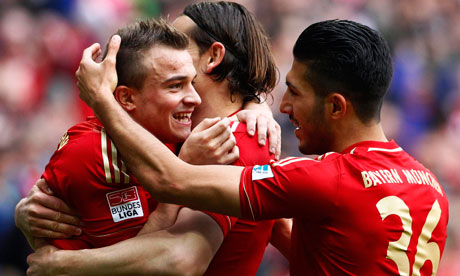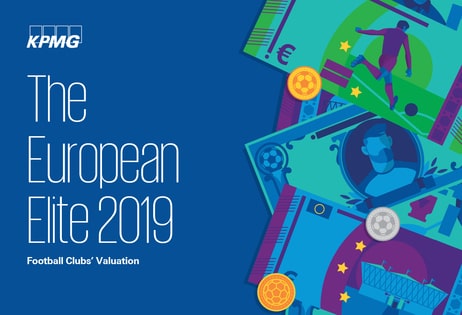"You can already sense that the German-Spanish football festivities that will begin in eight days in Munich and Dortmund and might continue until the 25 May in Wembley amount to the highlight of the season for German club football – if not of the past few years and decades," wrote Frankfurter Allgemeine Zeitung.
And why not? This really is a success story made in Germany, after all, with German players, coaches and bosses as the leading protagonists, unlike … let's not go there. But in our blessed land of Mercs and money, happiness is never much more than the temporary abatement of angst. It's only taken a weekend featuring a couple of effortless wins by the big two for the agenda to change from pride to worries, doubts and uncomfortable questions. The new queasiness has brought with it a new buzzword. The Bundesliga is suddenly gripped by fear of Spanische Verhältnisse (literal translation: "Spanish relations").
It sounds a bit like an 18th century disease, the sort of thing you might have caught after too many amorous adventures. The real problem, however, is that Bayern and Dortmund are so strong that they can field C teams and still pummel the domestic opposition (a 4-0 win over Nürnberg, a 6-1 at Fürth, respectively) with unnerving ease this season, and the league's USP, its (relatively) egalitarian unpredictability, seems to have given way to La Liga-style duopoly of out-of-sight excellence. Hence the Spanish relations, or "a Spanish situation".
Even Uli Hoeness, the man who once spoke of his wish to be so far ahead of the the pack that they would have to resort to using binoculars to catch a glimpse of Bayern's behind, is suddenly a little distressed. "There's a big difference in performance levels in the league," the Reds president told Kicker. "We can't be comfortable with that. We have to analyse why this is the case." The 61-year-old added that results such as Bayern's 9-2 destruction of Hamburg were unacceptable in the long run. "This calls for action," he said. He revealed that he and the Dortmund CEO Hans-Joachim Watzke were talking about the matter.
Hoeness's concern for his rivals' lack of competitiveness almost sounds like a belated April Fools' Day joke but he's dead serious. Watzke, on the other hand, is apparently less perturbed. "We won't install a taskforce," he said. "Others, like Werder Bremen, have played in the Champions League for years, too. You wonder where all the money has gone."
The rest of the league is split into those who have always warned about the gap getting bigger and are now bemused by Hoeness's foray ("it's ridiculous, like putting the fox in charge of the henhouse," said the Eintracht Frankfurt manager Heribert Bruchhagen), those who feel that it could actually be a lot worse if it wasn't for centralised TV rights sales (the Hannover chairman Martin Kind) and those who believe the problem is simply overstated. "It's just a snap shot, Dortmund's success is too recent," the Schalke 04 finance director, Peter Peters, told Süddeutsche Zeitung.
Peters is right, in a sense. Dortmund weren't anywhere near the apex of the Bundesliga, let alone Europe, three years ago. And their financial power isn't nearly as big as Bayern's, whose turnover will come in at around €400m. The Black and Yellows' turnover of approximately €250m for the current season is only slightly higher than Schalke's in 2011-12 (€224m) – for example. Leverkusen, Stuttgart and Hamburg are all near the €100m mark – without Champions League football. Frankfurt, Düsseldorf and even Köln, currently in the second division, are big, well-supported clubs with the potential to grow into the next Dortmund one day as well.
The Bavarians' 20 point-gap over last year's double winners Borussia would suggest that the league's main problem isn't so much the dominance of two clubs but that of one, at least this season. The Reds had been underachieving, relative to their wealth over the last decade but have now, perhaps for the first time, performed exactly in line with their financial superiority. History suggests that this is an exception, rather than the rule, since they have always found ways to negate – or at a very minimum, mitigate – their off-pitch advantages in the past, be it through disastrous managerial appointments or a hit and miss transfer policy.
In 2012-13, however, the rest of the league have made all the mistakes. Dortmund (inadvertently) concentrated on the Champions League. Schalke made a managerial change halfway through the campaign and almost lost their way completely. Hamburg and Bremen are at best treading water through managerial incompetence. Stuttgart's austerity drive has hurt them, Wolfsburg are still busy cleaning up the Felix Magath mess and Leverkusen are simply happy to be were they are.
All of them are in effect shown up by Freiburg, the third-smallest club in the league with an estimated wage bill of €17m. Only Düsseldorf (€15m) and Fürth (€12.5m) pay less. And yet here they are, in fifth place, threatening to qualify for the Champions League and close to getting a ticket into Europe through their exploits in the DFB Cup. Christian Streich's men travel to Stuttgart for the semi-final on Wednesday. If champions Bayern win their game at home to Wolfsburg on Tuesday, the south-west derby will effectively become a play-off for the Europa League.
Whether Freiburg will be able to field a decent XI in that competition is doubtful, however. Streich, the slightly manic but admirably genuine architect of this tremendous run, has become wary of praising his players, for fear of attracting even more unwanted attention. Jan Rosenthal (Frankfurt), Max Kruse (Gladbach), Daniel Caligiuri (Wolfsburg or Leverkusen) are all off this summer, and more could follow. They've all looked very good, possibly beyond their real talent, thanks to Streich's motivational skills and tactical ingenuity. Freiburg press like Mainz, defend like Bayern and are effective in front of goal like no other team in the league, all with minimal resources.
No one expected the 47-year-old to keep the club up when he took over in December 2011, but he did. The current campaign has been more miraculous, still. His super-broad alemannic accent – Streich hails from a village near the Swiss border – and his unfiltered statements made him an unlikely candidate for success in the league but in fact, he should be a role model, an antidote to Spanish relations or similar ills. It's simple: much bigger and much better teams wouldn't be nearly as far away from the top if they had just shown a little more care in their managerial appointments. Streich's success is a triumph of hard work and intellect over image and rhetoric. Hamburg were able to make that very choice in 2008, when they negotiated with Jürgen Klopp, then at Mainz. But Klopp's unshaven appearance and well-worn jeans displeased the northerners' bosses. So they opted for an "established", "safe" manager instead, and appointed Martin Jol.
Talking points
• Now that the trophy is on its way back to Munich, Bayern and Dortmund are locked in a battle of lowball poker – who can win with the weakest hand? On Saturday, the Bavarians dispatched in-form Nürnberg 4-0 with a side that had Emre Can, 19, and Anatoliy Tymoshchuk, 34, anchoring the midfield, while Dortmund cruised to a 6-1 win at Fürth with a strong team that ended up as a pretty experimental outfit by the time 90 minutes were up. José Mourinho was keeping a watchful eye in the Trolli-Arena but the BVB bosses seemed to feel he was in fact trolling them with his presence in such inauspicious surroundings. "I don't know why he's here, maybe he wants to show he's preparing diligently," sneered Watzke. "He could have called me," said Klopp. "Nothing he gleaned from this game will be of any value in two weeks' time."
• The Dortmund manager also dominated the local agenda from top to bottom – literally. First, he admitted to a hair transplant in Bild ("It looks cool, doesn't it?"), then he placed a risky wager: "I bet my arse that Matthias Sammer will talk to Pep Guardiola," he said. The Bayern coach Jupp Heynckes had earlier taken great offence ("Please respect me and my team, I can prepare myself") at a reporter's suggestion that he may ask his predecessor for insight. This being Bayern – three people, four opinions – Franz Beckenbauer actually agreed ("of course they should ask Pep"), but chairman of the board Karl-Heinz Rummenigge toed the company line. "It would have been better for Klopp to bet his hair, as he has some more to transplant. But I fear his arse will end up in our museum." Maybe it could be exhibited right next to Rummenigge's infamous "Danke, Franz" poem from 2010, as blogger Klaas Reese (@Sportkultur) suggested.
• But that's enough puerile humour for now, thank you very much. In more serious news, Augsburg are "frightening the league" (Süddeutsche Zeitung) because their Dong is massive. Yes, the South Korean international Ji Dong-won, on loan from Sunderland, was the match-winner with two goals in the 2-0 over Frankfurt. The win saw Markus Weinzierl's team defend 16th place and put more pressure on their relegation rivals Düsseldorf and Werder. "I scored twice, we won, that was important, very good," said Ji, who is reportedly warming to the idea of spending more time in Augsburg, also known as the Fuggerstadt. It looks like a pretty good fit for him.
Results: Freiburg 3-1 Hannover, Augsburg 2-0 Frankfurt, Stuttgart 2-0 Gladbach, Bayern 4-0 Nürnberg, Greuther Fürth 1-6 Dortmund, Schalke 2-2 Leverkusen, Wolfsburg 2-2 Hoffenheim, Mainz 1-2 Hamburg, Düsseldorf 2-2 Bremen.{jcomments on}
http://www.guardian.co.uk/football/blog/2013/apr/16/bundesliga-bayern-munich-borussia-dortmund
 IN ENGLISH
IN ENGLISH 







































